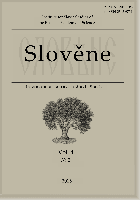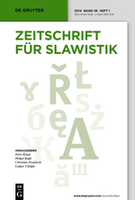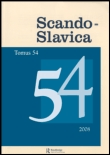
Palaeobulgarica-Starobalgaristika
Scope & Guideline
Exploring Bulgaria's Rich Cultural Tapestry
Introduction
Aims and Scopes
- Historical Manuscript Studies:
The journal publishes research that delves into the history, analysis, and significance of historical manuscripts, particularly those related to Old Bulgarian and Slavic texts. - Linguistic Analysis and Translation Studies:
A core focus is on the linguistic characteristics of Old Church Slavonic and its translations, including lexical semantics and terminology. - Cultural and Religious Heritage:
The journal highlights the cultural and religious aspects of the Slavic world, exploring themes related to hagiography, liturgical texts, and the influence of Byzantine traditions. - Paleography and Codicology:
Research on paleographic methods and codicological studies is emphasized, providing insights into manuscript production and textual transmission in the medieval Slavic world. - Interdisciplinary Approaches:
The journal promotes interdisciplinary studies that connect literature, history, linguistics, and cultural studies, fostering a comprehensive understanding of the Slavic heritage.
Trending and Emerging
- Digital Humanities and Technology in Manuscript Studies:
Recent publications highlight the use of digital technologies for analyzing and preserving manuscripts, indicating a trend towards integrating digital tools in traditional scholarship. - Detailed Codicological Studies:
There is an increasing focus on the specifics of manuscript codicology, including the physical attributes of manuscripts and their implications for understanding Slavic literary traditions. - Translational Studies of Religious Texts:
Research examining the nuances of translation in religious texts, particularly the Old Church Slavonic translations, is gaining traction, reflecting its importance in understanding cultural transmission. - Interdisciplinary Studies of Cultural Memory:
Emerging themes include the exploration of cultural memory and the legacy of figures like Cyril and Methodius, illustrating a renewed interest in the interplay between memory, identity, and textual tradition. - Hagiographical Studies:
An increased number of studies focusing on hagiography, particularly in relation to lesser-known saints and their narratives, suggests a revitalization of interest in this genre within Slavic literature.
Declining or Waning
- General Historical Narratives:
There appears to be a waning interest in broad general historical narratives that do not focus on specific texts or linguistic elements, as more scholars opt for targeted studies. - Comparative Studies with Non-Slavic Cultures:
Comparative analyses that involve non-Slavic cultures seem to be less frequent, possibly as the focus narrows to more localized Slavic studies. - Focus on 20th Century Literature:
Research related to 20th-century Slavic literature has decreased, with scholars increasingly prioritizing earlier periods of Slavic history and literature. - Overviews of Slavic Dialects:
Studies that provide broad overviews of Slavic dialects rather than detailed analyses of specific dialectal features have become less common. - Theoretical Linguistic Frameworks:
There is a noticeable decline in papers applying theoretical linguistic frameworks, as practical analyses and historical contexts take precedence.
Similar Journals

Slavia Meridionalis
Unveiling new perspectives in Slavic academic discourse.Slavia Meridionalis is a distinguished open-access journal published by the Polish Academy of Sciences, Institute of Slavic Studies, dedicated to advancing scholarly discourse in the fields of Anthropology, Cultural Studies, History, Linguistics and Language, and Literature and Literary Theory. With its ISSN 1233-6173 and E-ISSN 2392-2400, this journal has made significant strides in promoting research since its inception in 2014. Operating from Warsaw, Poland, Slavia Meridionalis aims to serve as a pivotal platform for researchers and students alike, fostering interdisciplinary collaboration and knowledge dissemination. The journal holds respectable rankings in its various categories, some achieving Q3 status, which reflects its commitment to quality scholarship within the academic community. By providing open access to its readership, Slavia Meridionalis ensures that pivotal research is readily available for the global audience, thus enhancing its relevance and impact across diverse fields.

Slovene-International Journal of Slavic Studies
Illuminating the Rich Tapestry of Slavic ScholarshipThe Slovene-International Journal of Slavic Studies, published by the Russian Academy of Sciences, Institute of Slavic Studies, serves as a vital platform for scholarly discourse in the fields of Cultural Studies, History, Linguistics, and Religious Studies. Since its transition to Open Access in 2012, the journal has enriched academic dialogue, enabling wider circulation and accessibility of research findings. Based in the Russian Federation, the journal supports interdisciplinary approaches, inviting contributions that push the boundaries of traditional Slavic studies. With a commendable ranking in the Q3 quartile across multiple categories as of 2023 and respectable Scopus rankings, it stands out as a crucial resource for researchers and students alike, enhancing their understanding of Slavic and related cultural contexts. The journal's commitment to fostering international collaboration and dialogue positions it as an invaluable asset for anyone engaged in the complexities of Slavic studies.

ZEITSCHRIFT FUR SLAWISTIK
Decoding the Essence of Slavic Literary TraditionsZEITSCHRIFT FUR SLAWISTIK, published by WALTER DE GRUYTER GMBH, is a renowned journal focusing on Slavic studies, encompassing various fields such as cultural studies, linguistics, and literary theory. With its ISSN 0044-3506, this distinguished journal has been a significant contribution to the academic community since its inception in 1956, continuing to disseminate valuable research until 2024. While maintaining a strong reputation within several academic categories, ZEITSCHRIFT FUR SLAWISTIK holds a Q3 ranking in Cultural Studies and Linguistics and Language, and a Q2 ranking in Literature and Literary Theory as of 2023. This positioning underscores the journal’s impact, particularly as it caters to an audience of researchers, professionals, and students invested in the rich tapestry of Slavic culture and language. Access to this journal is not open; however, its comprehensive articles are crucial for anyone aiming to explore and deepen their understanding of Slavic linguistic and literary traditions. The journal's work is essential in fostering cross-disciplinary dialogue and advancing scholarship in these vital areas.

Scando-Slavica
Unveiling the Complexities of Cultural ExchangesScando-Slavica is a renowned academic journal published by ROUTLEDGE JOURNALS, TAYLOR & FRANCIS LTD, specializing in the rich interplay of Scandinavian and Slavic studies. With its ISSN 0080-6765 and E-ISSN 1600-082X, the journal has been a critical resource for scholars since its inception in 1954, covering a wide range of disciplines including archaeology, cultural studies, history, linguistics, and literature. As of 2023, it has consistently ranked in the third quartile across various categories, indicating its influential role in disseminating innovative research within the arts and humanities. With a focus on interdisciplinary dialogue, Scando-Slavica aims to foster a deeper understanding of cultural exchanges and linguistic connections, making it an essential read for researchers, professionals, and students interested in exploring the complexities of Nordic and Slavic interactions. While currently not an open access journal, its contributions have garnered substantial citations, bolstering its academic impact and relevance in a diverse scholarly landscape.

BULLETIN OF THE SCHOOL OF ORIENTAL AND AFRICAN STUDIES-UNIVERSITY OF LONDON
Advancing Knowledge in Cultural Studies and HistoryBULLETIN OF THE SCHOOL OF ORIENTAL AND AFRICAN STUDIES-UNIVERSITY OF LONDON, published by Cambridge University Press, stands as a pivotal journal in the fields of Cultural Studies and History, with an impressive track record dating back to its inception in 1917. With a current impact factor that places it in the Q2 quartile for both categories, this journal gives voice to a rich tapestry of research dedicated to the complexities of Eastern and African societies. Researchers exploring the nuances of cultural interactions, historical developments, and socio-political dynamics will find this publication invaluable, as it offers peer-reviewed articles that contribute significantly to the academia surrounding these diverse fields. Although the journal is not open access, it continues to attract a dedicated readership due to its rigorous scholarly standards and reputation for quality. The BULLETIN also boasts a noteworthy Scopus ranking, reflecting its influence and reach within the global academic community. Located in the United Kingdom, the journal serves as a hub for international scholarly exchange, encouraging contributions that delve into the rich heritage and contemporary issues of Oriental and African studies.

Journal of Islamic Manuscripts
Enriching Cultural Insights Through Manuscript StudiesJournal of Islamic Manuscripts is a prestigious academic journal published by BRILL, dedicated to the study and preservation of Islamic manuscripts from their historical, cultural, and artistic perspectives. With an ISSN of 1878-4631 and an E-ISSN of 1878-464X, this journal serves as a vital platform for researchers, professionals, and students interested in Cultural Studies, Visual Arts, and Performing Arts. Housed in the Netherlands, the journal boasts a commendable rank within Scopus, showcasing its significant impact within its fields—ranking #229 in Visual Arts and Performing Arts and #690 in Cultural Studies for 2023. Operating under a traditional subscription model, the journal ensures its contributions are accessible to a global audience dedicated to furthering the understanding of Islamic art and heritage. Spanning from its inception in 2010 through 2024, the journal promises to continue enhancing knowledge and appreciation of the diverse narratives encapsulated in Islamic manuscripts.

WELT DER SLAVEN-HALBJAHRESSCHRIFT FUR SLAVISTIK
Fostering Dialogue in Slavic ScholarshipWelt der Slaven-Halbjahresschrift fur Slavistik is a distinguished academic journal dedicated to the field of Slavic studies, published by Harrassowitz Verlag. With a focus on the rich tapestry of Slavic languages, literature, and cultural theory, this journal provides a vital platform for scholars, researchers, and students interested in the complexities of Slavic linguistics and literary expression. It operates on a semi-annual basis, encompassing converged years from 2002 to 2015 and continuing from 2017 to 2024, ensuring a continuous dialogue in an evolving academic landscape. Despite its Q4 and Q3 rankings in various categories—such as Linguistics and Language, Literature and Literary Theory, and Visual Arts and Performing Arts—its impact is noteworthy, with Scopus ranks that place it within the upper percentiles of arts and humanities fields. While currently not an open access publication, it remains an essential resource for those engaged in the interdisciplinary exploration of Slavic cultures and their global significance. The journal emphasizes innovative research and critical analysis, making it a key contribution to the ongoing discourse in Slavistics.

Acta Baltico-Slavica
Bridging Cultures: A Platform for Slavic Academic ExchangeActa Baltico-Slavica, an esteemed academic journal published by the Polish Academy of Sciences, Institute of Slavic Studies, serves as a vital platform for the exploration of Slavic cultures, languages, and historical narratives. Since its transition to Open Access in 2014, the journal has fostered inclusivity and accessibility, allowing researchers, professionals, and students to engage with cutting-edge scholarship in the fields of History, Linguistics and Language, and Literature and Literary Theory. With a commendable impact as indicated by its category quartile rankings (Q2 in History and Literature, Q3 in Linguistics), and Scopus rankings reflecting its significance within the academic community, Acta Baltico-Slavica not only contributes to the rich tapestry of scholarship surrounding the Baltic and Slavic regions but also encourages interdisciplinary dialogue. The journal’s commitment to advancing knowledge across its fields of study makes it a prominent destination for scholarly discourse and research inquiry.

Slavia-Casopis pro Slovanskou Filologii
Advancing Scholarship in Slavic Language and LiteratureSlavia-Casopis pro Slovanskou Filologii is an esteemed journal dedicated to the advancement of Slavic philology, published by the SLOVANSKY USTAV AKAD CESKE REPUBLIKY in the heart of the Czech Republic. With its ISSN: 0037-6736, the journal serves as a vital platform for scholarly exchange, embracing a rich academic tradition since its convergence years beginning in 2002. The journal has achieved notable recognition, with a Q3 ranking in Linguistics and Language and a Q2 in Literature and Literary Theory as of 2023, highlighting its contribution to these dynamic fields. Although it does not currently offer open access, its rigorous selection of articles ensures that it remains a crucial resource for researchers and practitioners alike, facilitating a deeper understanding of Slavic languages and literature. Scholars benefit from the journal's extensive research backdrop, enhanced by its current ranks in the Scopus database, underscoring its significant placement within the academic literature landscape. The editorial scope of Slavia promotes innovative inquiries that reflect cultural, historical, and theoretical perspectives endemic to Slavic studies, making it indispensable for professionals, students, and enthusiasts invested in the exploration of Slavic linguistic and literary heritage.

BULGARIAN HISTORICAL REVIEW-REVUE BULGARE D HISTOIRE
Fostering Dialogue: Where Bulgaria's History Meets ScholarshipBULGARIAN HISTORICAL REVIEW - REVUE BULGARE D HISTOIRE is a distinguished journal published by the PUBL HOUSE BULGARIAN ACAD SCI, providing a critical platform for the exploration and analysis of historical narratives pertinent to Bulgaria and its broader regional context. With an ISSN of 0204-8906, this journal has been a reservoir of scholarly research since its inaugural issue, recently covering years from 2001 to 2007 and again from 2009 to 2023. Despite its classification in the Q4 category of History, it uniquely contributes to understanding and preserving historical insights, as reflected in its modest but growing impact in the academic community, where it currently ranks #1405 out of 1760 in Scopus Analytics. The journal aims to engage researchers, professionals, and students by presenting a diverse array of articles, encouraging scholarly discourse that sheds light on historical complexities and advancements. While it currently does not adopt an open-access model, it remains a crucial resource for those engaged in historical studies, particularly in Eastern European contexts.